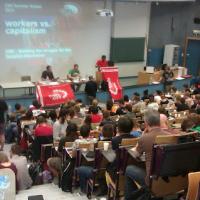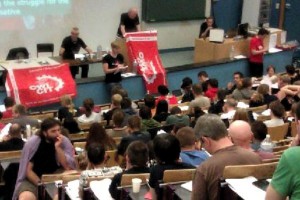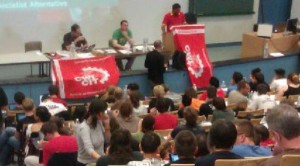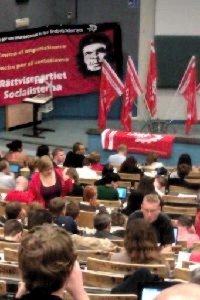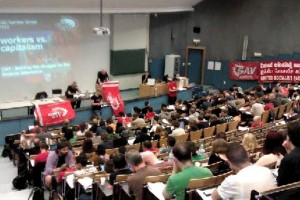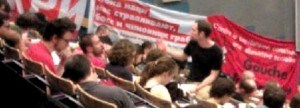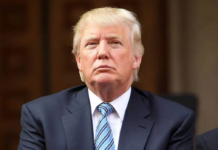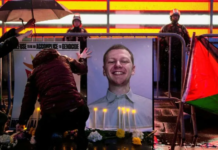Capitalist crisis and workers’ mass struggles take global dimensions
Finghín Kelly, Socialist Party (CWI Ireland)
This week, up to 400 people are attending the Committee for a Workers International (CWI) annual Summer School in Belgium, from all around Europe, including Russia, and also with visitors from Kazakhstan, Brazil, Canada, Quebec, Australia, Sri Lanka, Nigeria, Lebanon and elsewhere. In the first of several reports of some of the main School discussions, Finghín Kelly summarises the excellent discussion on World Economy and Relations, which took place on 8 July.
Socialistworld.net
The past year has been a tumultuous one in world relations. The world economy has continued to stagnate, the process of revolution and counter-revolution in North Africa and the Middle East has continued to develop and there has been an increase in tensions between states and within in states. Lynn Walsh from the CWI International Secretariat in opening up the discussion posed the question, ‘Is there any country in the world that is stable and not having strikes demos and crisis?’
More and more capitalist commentators have come to realise that the world economy is in a period of depression with the productive forces in stagnation. Lynn Walsh outlined in his introduction how in 2008 the ‘bubble-economy’ based on debt burst and plunged the world economy into crisis. Of the G7 countries, only 3 are producing more than they did in the pre-2007 period. Italy is still 5% below the peak and Greece is a massive 15.9% below the 2007 peak.
The period following collapse of the USSR and Stalinism was one of capitalist triumphalism. Capitalist commentators claimed that the market economy was the only way of organising society; it could overcome economic problems and provide stable democratic governments. They claimed there would be a new stable world order under hegemony of US imperialism. However, if we look at the world now nothing could be further from the truth.
Tensions between different rival capitalist powers have grown in the crisis. This has been illustrated by the collapse of the Doha trade talks and an increase in what the WTO has called ‘creeping protectionism’. These tensions were also evident in the recent Rio environmental summit where the major capitalist blocks were unable to make any substantial agreements on environmental targets.
Increased military tensions
This increase in tensions has also been seen in an increase in military tensions. In the United States, President Obama recently announced that the USA would concentrate more military resources in the Pacific region. This is based on the idea that China in an emerging strategic rival for the USA. Robert Bechert, replying to the discussion, pointed out that last year saw the highest number of wars since end of World War 2 in 1945; there are now 20 on-going wars alongside 18 other ‘highly violent conflicts’. This is reflected in the enormous growth in military spending. In last 10 years, the real expenditure on military has increased 60%.
The last year has seen massive struggles taking place around the world. The tremendous struggles that brought down regimes across North Africa and the Middle East have continued in the past year. These convulsions have brought down regimes that had been backed financially and militarily by imperialism and the movements have been a major factor of instability in world relations.
The discussions saw contributions from Jon Dale from the England and Wales section and a comrade from Lebanon, who spoke about developments in the region of the Middle East. He reported how the lack of a strong independent working class opposition to the Assad regime has allowed the movement against Assad to increasingly descend into a sectarian conflict with more than 16,000 people killed since March of last year, including 5,500 people in the city of Homs. The situation in Syria has also lead to instability in the region and intervention of regional and international powers. Russia and Iran are key weapons suppliers for the Assad regime and many Gulf States, especially Qatar and Saudi Arabia, supply arms to the increasingly well-armed opposition.
Egypt
Jon spoke about the situation in Egypt where recently the Muslim Brotherhood’s candidate, Mohammad Mursi, was elected in the Presidential election. Mursi was congratulated by many capitalist representatives, including US Secretary of State, Hillary Clinton who even flew to Cairo to congratulate Mursi on his election. These representatives correctly understand that if the candidate backed by the military, Ahmed Shafiq, won there could have been a huge backlash and it could have re-ignited the revolutionary struggle. Mursi will come under pressure from many directions, as well as pressure from imperialism, he will also come under pressure from the movements from below. The economic programme of the Muslim Brotherhood is neo-liberal and pro-capitalist and offers no real alternative for the working class and poor of Egypt. The budget for this year based on 4% growth but in reality will be closer to 1%. It is likely that the newly elected government will need to negotiate a loan from the IMF and the price for that will be a cut in the subsidies for food and fuel for families. It will become clear very soon that Mursi has no answer to workers’ problems especially as power will still lie with leaders of military. Having been blocked on the political road workers will now look again more to the avenue of struggle. One of the most significant developments in the revolution has been the growth in independent trade unions. There are now 2.5 million members of independent trade unions in Egypt, up from 50,000 before the revolution. It is clear that the revolution is still on-going and we are sure to see action from the working class return in the form of strikes and sit-ins which can lead to further pressure on the military leaders and on the newly elected Mursi government.
Robert Bechert spoke about the military’s intervention in Egypt to annul the parliamentary elections was, in effect, a form of coup. He pointed out that in a leaflet distributed by the CWI in Egypt on the day of Mubarak’s resignation warned of top generals trying to keep power and the need to build and independent workers’ movement to combat this and to bring the revolution forward.
Many contributors spoke how the economic slowdown in China will have a big impact on countries, such as Brazil and Australia, which based their economic growth on commodity exports to China. Tim from Australia reported how the mining boom in Australia, which is based on exports to China, has been playing a crucial role in propping up the Australian economy. Other sectors of the economy are in stagnation or even in recession. A decline in the Chinese economy will therefore have a huge impact in Australia and open up the prospect of struggles in Australia in the coming period.
The situation inside China was also a key feature of the discussion. A number of contributors reported how the regime implemented a massive stimulus package which has seen an estimated 12% of GDP pumped into the Chinese economy. This was mainly spent on infrastructure and has resulted in the inflation of massive bubbles in the Chinese economy. This is very evident in the property bubble in China which was illustrated by Vincent from Hong Kong who reported that there are now 64 million empty houses in China and a huge increase in local government debt due to speculation by local government in the property sector. China has also seen massive struggles in the recent period; Jacko from Hong Kong reported how there has been 180,000 ‘mass incidents’ in mainland China in 2010 and 100,000 workers’ struggles last year. There was also a massive 400,000 strong protest in Hong Kong on 1 July of this year calling for democratic reforms in Hong Kong.
China slowdown?
The economic slowdown in China and the mass pressure from below has reflected itself in open splits and divisions in the tops of the Chinese ruling elite for the first time since 1989. These divisions are not based on ideological differences but rather differences on how best to maintain their rule. The Bo Xilai affair which has seen a leading ‘princeling’ of the ruling CCP fall out with the bureaucracy and has exposed the tensions that exist in the regime. Bo Xilai had used populist demagogy to mobilise support behind himself in opposition to other wings of bureaucracy. As well as exposing the corrupt nature and massive personal wealth of the Chinese ruling elite, the affair has also demonstrated that there are cracks in the regime that can be opened up with working class struggles in the coming period.
The situation in the USA was also discussed during the session. Katie from the USA reported how the 2011 ‘Occupy’ movement exploded nearly overnight. This explosion was based on anger over job prospects and anger at the increasing decline in living standards. The latest job figures from the USA show only 80,000 new jobs have been created in the last month. This demonstrates a decline compared to recent years. President Obama has shown that he in no way is prepared to fight to implement pro-workers policies and has shown himself to be a representative of big business. Last year we saw a magnificent movement in Wisconsin by students and workers against the Republican governor, Scott Walker, who has attacked workers’ union rights. In this movement there was much discussion on the question of a general strike. Union leaders however tried to divert the struggle down electoral lines and push it into a campaign for a recall vote on Governor Walker that took place earlier this year. Democrats in Wisconsin were unwilling to take real action to remove this hated governor which really exposed the real pro big business nature of the Democratic Party. Workers in the USA now face the prospect in November of a ‘no choice’ election and even the chance that Republican candidate Mitt Romney winning due to the disappointment with Obama.
Following the collapse of Stalinism and after US imperialism’s so called ‘Shock and awe’ policy many , including some of those on left believed that nothing could stand in way of military power of US imperialism. However, despite spending US$3 trillion on wars they have failed to achieve their objectives. Afghanistan is still ruled by warlords. The Tokyo conference concerning further financial aid to Afghanistan has highlighted that there is massive corruption in Afghanistan. The war in Afghanistan is also creating a crisis in relations between the USA and Pakistan over Taliban activity on the borders between Pakistan and Afghanistan and, in particular, the drone attacks which have claimed many civilian casualties. President Obama has tried to distract from this disaster by claiming credit for Bin Laden assassination. Iraq is also a country in crisis following imperialist intervention and faces the danger of a descent into civil war at any time.
When Obama first came to office he said one of his administrations major concerns would be peace in the Middle East between Israel and Palestinians. It is impossible to say there has been any real progress on this issue. Despite Palestinian leader Mahmoud Abbas being willing to make concession after concession the Israeli regime has not moved an inch on its policy. This is leading to huge anger among the Palestinian masses and raises the prospect of another intifada involving some form of mass protest. In Israel, Prime Minister Netanyahu seems to have a strong coalition but this masks the underlying weakness of his government’s position. In Israel there were massive social movements in May which is putting real pressure on the government.
Despite nearly all the major capitalist commentators and strategists warning against a strike on Iranian nuclear facilities there has been increasing rhetoric against the Iranian government’s nuclear programme from the Israeli regime. The repercussions of a military strike in the region would be massive. However it is not ruled out that the Israeli regime could still launch an attack due to the instability of the regime itself.
Capitalism called into question
Developments in recent years have led to the legitimacy of the capitalist system being called into question by millions of people around the world. Capitalist leaders are being systematically discredited in the recent period this is seen in Europe where there has hardly been an incumbent government that has not been overturned in elections and their policies have provoked massive movement of workers, middle class and youth. Attacks on education are a feature of the neo-liberal attacks around the world. Dominique from Canada spoke about attacks in education in Canada and also the magnificent student lead movement in Quebec against neo-liberal policies. Jared from New Zealand also spoke about the movement of students which faced brutal police repression.
The situation with the world economy was a key feature of the discussions during the session. Mass unemployment is commonplace in many parts of the world. There is now 200 million unemployed around the world, 75 million of which are young people. This unemployment exists at the same time that the major corporations around the world are hoarding huge amounts of cash they are not investing at this period. This is because these corporations cannot find channels of investment that can satisfy their greed for profits. This is the crazy logic of the capitalist system which put private ownership and greed ahead of the needs of the world’s millions. Lynn Walsh explained that the crisis we are seeing now is a basic crisis of capitalist accumulation; it is a profound crisis of the capitalist system and not a cyclical crisis that will go away in a few years. He traced back the crisis to having its origins three decades ago to the end of the post-World War 2 upswing which ended in the early 70s. At this point, the capitalists turned to financial speculation as they could not make enough profit from manufacturing. Finance capital has become more dominant in world economy with the implementation of neo-liberal policies. Since late 80s, the major factor in growth has been increased debt and this is why the crisis since 2007 has been as deep as the credit bubble has burst on a world scale.
Per Åke from Sweden in his contribution explained that in the immediate aftermath of the crisis the US and most EU governments seemed to learn the lessons of the 1930s and turned to stimulus to avoid a complete collapse of the economy. Governments have very quickly turned to austerity after these initial stimulus packages. Other measures, such as ‘Quantative Easing’, which is essentially the policy of governments’ printing money, has not led to any real growth in the economy but has just filled the coffers of the banks and fuelled speculative activity. The bourgeois internationally are now discussing so called growth policies.
Nigeria and South Asia
During the discussion there was some attention paid to exactly what is meant by such growth policies. There are two types of growth policy put forward by capitalist commentators and politicians. One type is neo-liberal; concessions to big business in hope they will produce more – it means tax concessions, more deregulation and the eradication of legislation that protects workers’ rights. On the other hand; some argue for Keynesian measures which would increase public spending on the understanding that government debt would be increased and debt not paid back for a longer period. This Keynesian policy is being firmly opposed by finance capital who can manipulate the bond markets against governments that implement these policies.
The situation in Nigeria was reported on in the discussion by Abbey. January saw a mass movement and week-long general strike in opposition to the removal of the subsidy on fuel which has meant a massive hike in living costs for working people. While winning a small cut in the price rise, the trade union leaders consciously opposed the growing popular calls for “regime change” and called the strike off. As the falling oil export price cuts the government’s income there is now also the threat of the removal of the Federal government subsidies in education which would mean putting education beyond the reach of working class students. Significantly more workers and others are questioning the role of the current trade union leaders and looking for an alternative.
The disastrous effects of neo-liberal policies on the working people of South Asia were also featured in the discussion. These policies have devastated the poor of the region and also have pushed the middle layers into poverty which is creating an explosive situation. In his contribution, Senan pointed out that these policies have resulted in 10 million people in India living in slums while millions of homes built in a property bubble lie empty. Corruption among the ruling classes in the region is rife. This is highlighted by the removal in a corruption scandal of the prime minister of Pakistan; a country where it is estimated corruption is at 20-25% of the country’s GDP. In Sri Lanka, the Tamil people continue to suffer under the Sinhala chauvinist Rajapaksi regime. However there has been an important victory against the regime with a successful victory in struggle against price rises in fuel.
Kazakhstan
The explosive situation in Kazakhstan was also featured. Essenbek from Kazakhstan reported on the mass movement of workers in the West of the country which has faced massive repression from the state including the massacre of demonstrating workers in Zhanaozen, last December
In his conclusion, Robert Bechert said that the background to the past two decades has been the collapse of Stalinism and ideological effect it had on the workers’ movement. He drew the comparisons between the working class movement in late 19th century and the current period. In the late 19th century, the socialist workers’ movement was developed through the experience of struggle alongside the conscious intervention of socialists into this movement. He concluded that it is precisely in this period of struggle that we can intervene not just to build socialist movement but to change the world and that is the purpose of this discussion and the discussions during this summer school.

